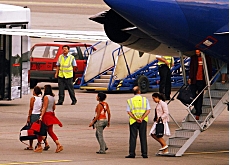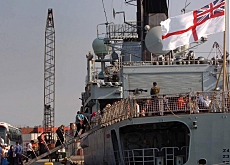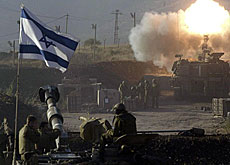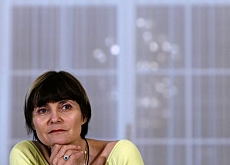Lebanon evacuees return to Switzerland

The first groups of Swiss nationals evacuated from Lebanon have returned to Switzerland.
Two aircraft carrying about 220 people arrived on Thursday evening. A third flight with 117 people on board touched down in Zurich on Friday morning.
The first group of evacuees was welcomed at the airport by Foreign Minister Micheline Calmy-Rey.
By Friday 500 Swiss nationals had been able to leave Lebanon, and at least another 300 were waiting for a way out. A ship chartered by Switzerland is expected to dock in Beirut on Saturday to transport more citizens.
The ministry said fighting in southern Lebanon was making efforts to evacuate Swiss nationals from that part of the country “extremely difficult”.
Calmy-Rey has called for a ceasefire between Israel and Lebanon’s Islamic Hezbollah militants and insisted on the application of humanitarian law.
The foreign minister said in Bern on Thursday that a negotiated end to the conflict, which began ten days ago after Hezbollah kidnapped two Israeli soldiers, was the only viable solution.
She added that while the soldiers should be returned, a prisoner exchange would be a more likely step towards defusing the crisis.
Switzerland, like many other countries, has conceded that Israel can conduct a military operation to recover its men held in southern Lebanon. But the government says the Israeli actions have gone too far.
Disproportionate
“The problem is that these operations are striking civilians, and destroying civilian infrastructures,” Calmy-Rey told swissinfo. “These operations are disproportionate compared with their aims. Some governments have learnt nothing since the invasion of Iraq,” she added.
According to Switzerland, both sides in the conflict should only attack military targets, respecting humanitarian law set down in the Geneva Conventions of which Switzerland is the depositary state.
“We have reminded the belligerents a number of times that humanitarian law should be applied,” said Paul Seger, head of the foreign ministry’s international law directorate. “We are still neutral, since we are not taking sides with either party but defending the law.”
Besides a ceasefire, the foreign minister also called for the creation of humanitarian corridors. One would be by sea, stretching from Beirut to Cyprus, while the other would connect the Lebanese capital to the south of the country.
The humanitarian situation is particularly difficult at the moment in Lebanon. According to Swiss officials, there are 500,000 Internally Displaced Persons (IDPs), including 40,000 in Beirut alone.
Limited access
“The main problem at the moment is that we have very limited access to these people,” Toni Frisch, a top official at the Swiss Agency for Development and Cooperation (SDC), told swissinfo.
“We are trying to provide the Lebanese government with assistance for medical care and shelter.” People, who have been forced to leave everything behind as they flee the conflict zones, face a lack of sanitation, food and shelter.
The biggest concern is southern Lebanon, virtually under siege and where the fighting between Hezbollah and Israelis has been the fiercest.
“Access is practically impossible,” said Frisch. “There are humanitarian organisations that are present, but they can’t operate either [because of the fighting].”
In other parts of the country, the Swiss say they can help the Lebanese and efforts are underway to work more closely with the International Committee of the Red Cross and the United Nations.
swissinfo, Scott Capper with agencies
The fighting – the worst since Israel invaded southern Lebanon in 1982 – was triggered after Hezbollah seized two Israeli soldiers in a cross-border raid last week.
The Islamic militant movement is part of the Lebanese government and is backed by Syria and Iran.
The fighting has killed at least 300 people in Lebanon and 29 in Israel.
Estimates put the number of Internally Displaced Persons as high as 500,000.
Nearly 25,000 foreigners are believed to have been evacuated from Lebanon by Thursday, including 500 Swiss.
The Swiss foreign ministry says there are 838 Swiss nationals registered as resident in Lebanon, of which 713 hold dual nationality.
Family members can contact the foreign ministry hotline for further information on +41 31 325 33 33 from 8am to 9pm.
Swiss in Lebanon can contact the embassy in Beirut on 01 324 129 (only for evacuees).

In compliance with the JTI standards
More: SWI swissinfo.ch certified by the Journalism Trust Initiative




You can find an overview of ongoing debates with our journalists here. Please join us!
If you want to start a conversation about a topic raised in this article or want to report factual errors, email us at english@swissinfo.ch.